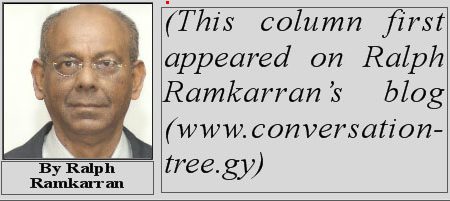
Trust and politics in Guyana
General Secretary of the PPP, Home Affairs Minister Clement Rohee, declared at his press conference last week that the PPP has no problem with shared governance and the ‘winner does not take all’ principle.
Follow
Profile
Articles by Ralph Ramkarran

General Secretary of the PPP, Home Affairs Minister Clement Rohee, declared at his press conference last week that the PPP has no problem with shared governance and the ‘winner does not take all’ principle.

Even if the PNCR had been minded to support the proposed AFC motion of no confidence against the government, it is not now likely.

The PNCR Congress is always an interesting time for political observers, not least because in recent times there has always been a challenge to the leaders and energetic contests for other positions.

The AFC released on Friday last a letter to the President of Guyana in which it advised that it will be tabling in the National Assembly a motion of no confidence in the government.

The census figures substantially confirm the analysis I made in an article ‘The future of the PPP’ published in November, 2012.

Contempt such as Ambassador Hardt is accused of in relation to the Head of State is a serious matter.

AFC Vice Chair, Moses Nagamootoo, announced that his party was contemplating a motion of no confidence against the government.

Once again the issue of an apology from the PNCR has become topical.

The Peoples’ National Congress (PNC) government nationalised the Demerara Bauxite Company in 1971.

Violence and corruption in the police force can no longer be classified as allegations.

The first appointment of a Queen’s Counsel in England was that of Sir Francis Bacon, made by Queen Elizabeth 1 in 1594, for a political purpose.

This is an appropriate time, on the occasion of the celebration of Guyana’s 48th Independence Anniversary, only two years before age 50, to begin the assessment of our condition as an independent nation and try to assess the future.

The case of Rudisa Beverages and Juices (Rudisa) v The State of Guyana, decided by the Caribbean Court of Justice (“CCJ”) on May 8, 2014, exposes not only the state of governance in Guyana over the past two decades but also symbolizes the complete loss of Guyana’s ability to achieve political agreement on any matter of consequence.
The ePaper edition, on the Web & in stores for Android, iPhone & iPad.
Included free with your web subscription. Learn more.